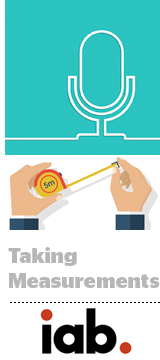
Podcast advertising is getting a bit more measurable.
The IAB Tech Lab updated its Podcast Measurement Guidelines on Wednesday to include definitions and best practices for measuring audience reach and downloads. The original guidelines, released in September, focused on defining ad delivery and how to count it consistently.
“But podcast measurement is for more than advertising usage,” said Steve Mulder, senior director of audience insights at NPR and co-chair of the IAB Podcast Technical Working Group.
Publishers like NPR need to know how audiences engage with their shows to inform continued investment and production, Mulder said. And buyers need insights around how those shows resonate with audiences for better targeting opportunities.
Podcast ad metrics are increasingly needed as the industry is projected to surpass $220 million in ad revenue this year, according to the IAB and PricewaterhouseCoopers.
But podcast measurement is limited because users download the content and listen offline. Even when someone listens to a podcast as it’s downloading, the file is progressively downloaded rather than live streamed onto the device. Without an online connection, publishers have no insight into listener engagement or habits after the point of download.
The IAB’s guidelines help publishers work around the limitations of the download by setting a standard process for how to analyze their server logs, which can provide information about the device that downloaded a show and, for shows downloaded while listening, to what point it was downloaded.
“When we have an industry standard, it lends credibility to every conversation,” Mulder said. “We can be on the same footing and talk about what our podcasts can do for sponsors.”
According to the IAB, publishers should begin measurement by filtering out downloads that come from duplicate or fraudulent IP addresses, requests that pre-load on a player or page and content downloaded that is less than one minute in length. Publishers can then count unique listeners, downloads and ad delivery signals that appear on the log based from server requests.
“Every time an audio player requests a podcast episode from a server, that is logged and the metrics are generated from that,” Mulder said.
But log-based measurement can’t reveal whether the episode was actually played by a human. That information belongs to the player, like Apple’s iTunes app or platforms like Stitcher and TuneIn, where listeners access and consume podcasts.
“The next phase of podcast measurement is player-based,” Mulder said. “We can get much more refined on what’s happening in that listening environment.”
Players have been slow to offer listener behavior data back to publishers because there’s no standard measurement or software, Mulder said. But Apple’s recent announcement that it will provide publishers with anonymous and aggregated player data is a huge step that could push the industry forward. Apple’s player captures more than 60% of podcast listening.
“It’s great for publishers because [Apple] is where most of their listening is. It opens a world of measurement for smaller publishers that wouldn’t have access to that data otherwise,” he said. “It also sends a message to the industry that detailed measurement is critical.”
But for now, Apple will only provide data about listening on its own platforms. Hundreds of other player apps in the marketplace will have to adopt a standard solution before player-based measurement becomes the norm. Until that happens, log-based measurement will remain critical, Mulder said.
“For player-based solutions, you have to convince hundreds of players to download your software,” Mulder said. “Log-based measurement doesn’t require relationships with all of the audio players across the universe.”
Still, the IAB’s log-based measurement guidelines require widespread adoption before becoming the industry norm.
“These are voluntary guidelines,” Mulder said. “We had an amazing collection of organizations at the table, but these are still relatively new.”
This post was syndicated from Ad Exchanger.

More Stories
Warner Bros. Discovery CEO David Zaslav Receives $51.9 Million Pay Package for 2024
TikTok Fave Duolingo Boosts YouTube Shorts Viewership 430% in One Year
Streaming Ratings, Week of March 10: Disney+ Sails to the Top Courtesy of Moana 2